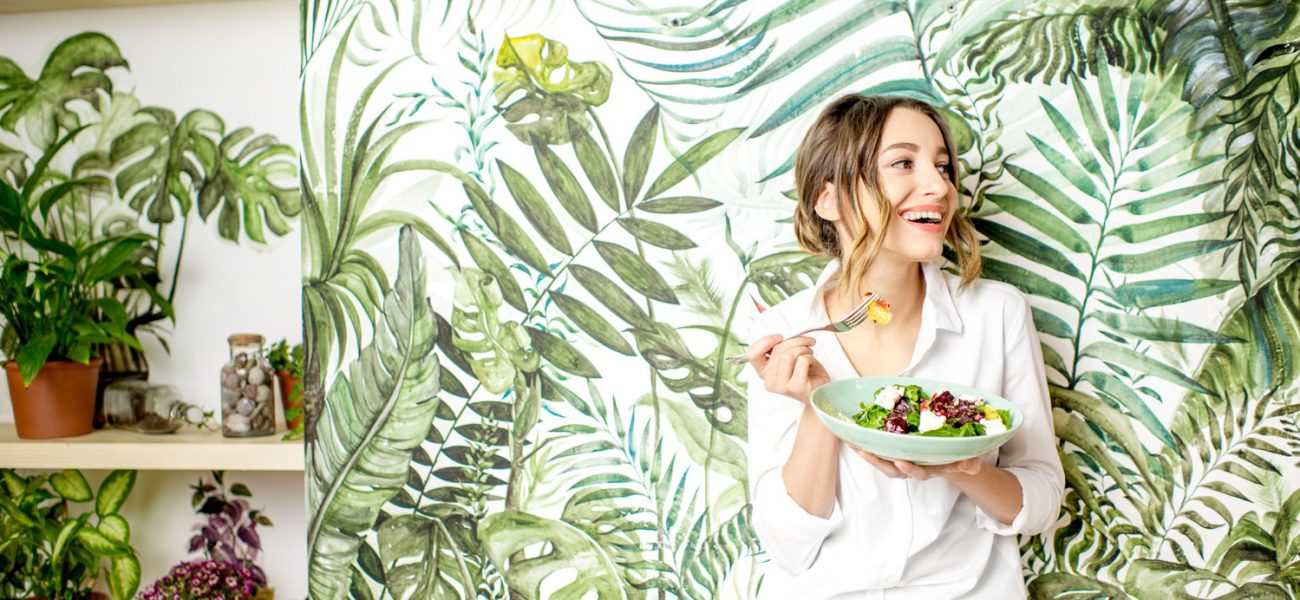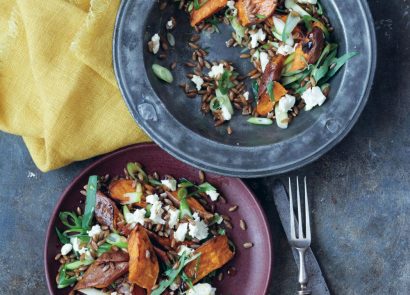Once seen as trends and awkward diet choices, you can’t deny the amazing growth in veganism and vegetarianism. In fact, supermarket giant Tesco is setting the bar high, as it’s aiming for a 300 percent sales target for plant-based alternatives to meat. So, with more people moving away from meat, we’re exploring the difference between a vegan and vegetarian diet, what the benefits are, and vegan and vegetarian recipes to get you started.
What is the difference between vegan and vegetarian diets?
If you’ve been toying with the idea of ditching meat for a plant-based diet, you’re not alone. According to new research, more than a quarter of all evening meals in the UK now contain no meat. The good news is that going veggie doesn’t have to mean a restrictive eating plan, despite what you may think. Instead, it’s one that can open you up to a whole new world of culinary experimentation. Vegetarians eat a mostly plant-based diet of grains, wheat, legumes, dairy, eggs and pulses. Vegans do not consume any animal products at all: this includes dairy and honey.
The benefits of being vegetarian
Carbon footprint aside, the reasons to go vegetarian are five-fold. Here’s why plant foods should be the stars of your plate.
You could live longer
The secret to longevity could well be sitting in your fridge. Research published in the research journal JAMA shows that vegetarians who eat a diet packed with essential nutrients like fibre, essential fatty acids, vitamins and minerals live longer when compared to meat-eaters.
It’ll help curb cravings
Can’t seem to keep pesky cravings in check? Switching to a plant-based diet that packs in the fibre helps you feel fuller so that you’re less likely to reach for sweet treats. Good sources to help you reach the recommended 30g quota include sweet potato, butternut squash and parsnips, plus oats and brown rice.
It’s good for gut health
A healthy digestive system equals a healthy body. While fatty foods like burgers and fry-ups can be tough to digest, triggering common complaints like heartburn and stomach pain, chowing down on fermented plant-based foods such as kimchi and sauerkraut can help to keep your gut in tip-top shape due to the high levels of probiotics they contain.
It could aid in weight loss
Packing more veggies and less meat into your diet is also linked to a slimmer figure. Research by Stanford University in the US found that weight loss was associated with the amount and quality of food, and not genetics. The results showed that those who ate the most vegetables and consumed the fewest processed products lost the most weight.
You could look younger
What you eat has a huge effect on your appearance, and trans fats from processed meat products could be the cause of bad skin and premature wrinkles. It’s thought that inflammatory foods like deli meats and burgers can trigger DNA and collagen-damaging oxidative stress, making you look older.
Getting enough B12 as a vegetarian
We’ll level with you: there aren’t many downsides to opting for more vegetarian choices, but those who do might be more susceptible to a vitamin b12 deficiency, as nutritional expert Dr Emma Derbyshire explains.
“B12 is essential in the functioning of the nervous and immune systems, and a deficiency can lead to a form of anaemia called pernicious anaemia, which causes your immune system to attack the cells in your stomach.”
So how can you boost your intake on a vegetarian diet? Dr Derbyshire says, “Good sources of vitamin B12 include eggs, dairy products and fortified breakfast cereals. While nutrients such as B12 should be obtained from eating a balanced diet, this is often a challenge for a lot of people, and that’s where supplements can really help.”
High protein vegetarian meals
Those who already follow a plant-based diet would have been posed with the question: ‘but where do you get your protein from?’ about a million times. Have they never heard of tofu or nut butter? You can rest easy with these vegetarian protein sources to make your vegetarian meal prep a breeze.
Aubergine lasagne
We can’t get enough of this delicious meat-free recipe from Jamie Oliver – make sure you use a vegetarian-friendly version of Parmesan!
Beetroot salsa Mexican Buddha bowl
This goodness-packed bowl of rainbow hues makes a vegetarian recipe that’s sure to brighten up your day. Omit the sour cream for a delicious vegan meal.
British Asparagus sweet potato and tomato shakshouka
This protein-packed plateful is perfect for a hearty, warming meal.
Paprika and California Walnut scrambled egg bagel
Get set up for a great day ahead with this tasty, hearty breakfast bagel recipe.
Tips for going vegan
If you’ve been converted by that Netflix vegan documentary, or stuck to your plant-based ways after giving Veganuary a go, you’ll often be posed with the question: ‘but what do vegans eat?’ Before you eye-roll yourself into next year, The Vegan Society has a clear definition you can refer to if you need to tell your friends: “Veganism is a philosophy and way of living which seeks to exclude – as far as is possible and practicable – all forms of exploitation of, and cruelty to, animals for food, clothing or any other purpose.”
It’s tricky to go cold turkey (sorry) when it comes to changing your meat-heavy diet to something more plant-based. So, here are seven things you should know before going vegan.
Veganism isn’t a weight-loss diet
One of the biggest myths surrounding a vegan diet is that you’ll lose weight just because you’re swerving the cheese and saying no to the office biscuits, so you’re right to ask the question, is a vegan diet healthy?
Cutting out cheese may lead you to lose a few pounds, but there are plenty of delicious vegan foods which are still calorific (chips, for example) so don’t expect to drop a dress size just by cutting out meat, eggs and dairy.
It’s difficult to go vegan overnight
We’re not saying it’s impossible, but it is a huge lifestyle change. Studies have shown that vegans who start as vegetarians and then slowly transition from vegetarian food to a vegan diet are more likely to stick to it. Remember, it’s not a race.
You’ll need to take B12 supplements
This vital vitamin is predominantly found in meat products and is essential for healthy nerves and blood cells. It helps to make DNA, and a lack of B12 can lead to tiredness, weakness, constipation, loss of appetite, nerve problems and even depression.
Be prepared to read food labels
Just because it looks vegan-friendly, doesn’t mean that it is. Thoroughly reading labels and understanding ingredients comes with the territory. For example, did you know ‘Natural Red 4’ is a food colouring derived from the bodies of female beetles?
Eating out will be different
We’re not saying you have to stay home with a salad while your meat-eating friends enjoy three courses. There are plenty of vegan restaurants popping up, and many eateries now provide more detailed menus which outline what dishes are suitable for a host of dietary requirements.
There’s usually a plant-based meal (probably a veggie burger, baked potato, pasta or roasted cauliflower) on every menu, but that doesn’t mean it’s a vegan dish. Either check the menu online before accepting a dinner invitation, or simply ask the chef if they can whip you up something more suitable – think of it like an exclusive dining experience.
You’re going to try new things
This exciting new journey is going to open your taste buds to new and wonderful flavours you probably hadn’t tried before. Yum!
People will ask questions
Instead of taking offence and assuming that they are looking down on vegan food, realise that they are merely inquiring to get a better understanding. They may be asking you for advice, as they could be considering going vegan too.
Supplements to consider when going vegan
Nutritionist Jenny Carson from Viridian Nutrition reveals exactly how a vegan diet can affect you if you’re 18-30, 30-45 and 45 and over.
Supplement with vitamin B12 if you’re aged between 18-30
“This period is prime for optimising nutrition and being especially mindful of bone health, detoxification besides mood and hormone supporting nutrients. Combining a busy work life with socialising and exercise demands at this age means the amount of nutrients is crucial. Dietary sources of vitamin B12 are exclusively animal sources. In fact, the vegan diet is completely deficient of this crucial vitamin. The body does not have the facility to store water-soluble B vitamins and so they are needed on a daily basis, in order to transport oxygen to the body’s cells to produce energy.”
Try a range of vitamins for those aged 30-45
“Parenting and peri-menopause are some of the biggest impacts of life between these ages, so focus should be on the adequate provision of magnesium, the B-vitamin family, calcium, vitamin D and K. When looking for food supplements, look for those that include good quality nutrients and do not use non-nutritive substances such as fillers, bulking agents, preservatives, colours, additives or sugar.”
Take vitamin D if you’re 45 and over
“This age group might be able to celebrate their newfound freedom from work and children, but the main health issues can be around bone, joint and cognitive health. Vitamin D supplementation can become an important inclusion in their daily regimen. Vitamin D has multiple roles in keeping your body healthy: maintaining bone health, immune function and normal blood calcium levels and aids the body’s absorption of other nutrients.”
Easy vegan meals and treats
Worried about trying some vegan cooking? These mouth-watering recipes will give you the motivation to go vegan.
Vegan chilli con carne with tortilla chips
This sensational vegan dinner recipe is a guaranteed feast for the senses, with an option to add vegan cheese. Dive in!
Chocolate and clementine fridge cake
Sweet treats aren’t just the preserve of veggies and meat-eaters: you’ll love this decadent vegan fridge cake. And in case you’re wondering, yes, McVitie’s digestive biscuits are vegan!
Vegan and vegetarian snacks and groceries
There’s no doubt the demand for vegan food is higher than ever. These game-changers will help keep you satiated from AM to PM.
Plantastic Chocolate & Cherry Flapjack with Sunflower Seeds, 3-pack, £2.25
Linda McCartney’s Vegetarian Southern Style Chicken Fillet Burger, 2-pack, £2.20
Oatly Salted Caramel Ice Cream, £4.50
La Boulangere Vegan Pain Au Chocolat, 6-pack, £2.00
The Vegetarian Butcher Good Karma Shawarma, £3.29
Whole Earth Dark Roasted Crunchy Peanut Butter, £3.00
GALAXY Vegan Smooth Orange Bar, £3




















